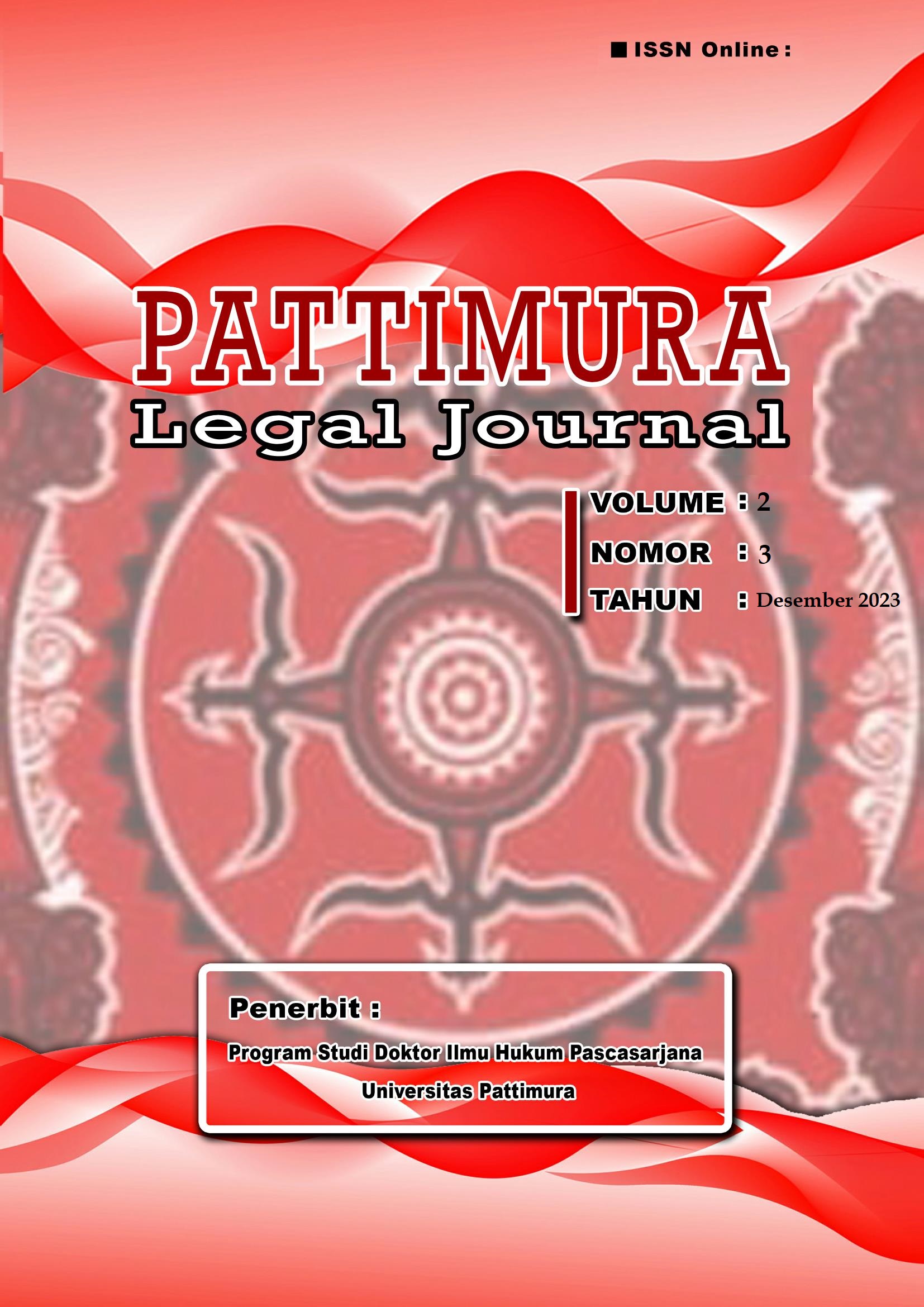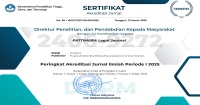Affidavit Sebagai Ratio Decidendi Putusan Onslag
Abstract
Introduction: The court concluded that the defendant had committed the acts alleged but that these did not constitute a criminal offense and were properly classified as a civil matter (onslag van recht vervolging) under Article 191(2) of the Indonesian Criminal Procedure Code. This ruling provoked profound dissatisfaction among KSP Indosurya depositors, who felt that their rights had not been adequately addressed within the criminal justice framework. Central to the court's legal reasoning was the submission of an Affidavit—a sworn declaration treated as a pivotal piece of evidence.
Purposes of the Research: This study seeks to examine the existence and significance of the Affidavit as a foundational basis for the court's onslag decision.
Methods of the Research: Utilizing a normative legal methodology, this research combines a case approach and statutory analysis and is conducted through a descriptive-analytical framework.
Results Originality of the Research: An Affidavit, or a sworn statement verified, becomes evidence in court proceedings. The emergence of the Affidavit is a manifestation of good intentions from KSP Indosurya, thus becoming the ratio decidendi in the judgment. The judge, in deciding the KSP Indosurya case, undoubtedly considers the legal objectives of justice, legal certainty, and utility. The basis for consideration, due to the presence of the Affidavit, has undoubtedly achieved legal certainty; however, the element of utility still needs to be questioned. The role of the judge in rendering a decision should not be solely based on the existence of evidence but should also involve a conscience that contributes partially. The role of conscience should enable it to penetrate the reasons why parties bring criminal claims, thereby producing a clear result. The judge's decision should serve as a deterrent for cooperatives' mafia or potential mafia due to their malicious intent.
Downloads
References
Adi, Rahmad. “Peran koperasi simpan pinjam dalam upaya pengembangan usaha mikro kecil dan menengah (umkm) di Kabupaten Aceh Barat (studi kasus pada koperasi simpan pinjam (ksp) mandiri jaya meulaboh).” Jurnal Ilmiah Basis Ekonomi Dan Bisnis 1, no. 1 (2022): 72–90.
“Affidavit.” Dalam Wikipedia, 14 Juni 2025. https://en.wikipedia.org/w/index.php?title=Affidavit&oldid=1295546970.
Afifudin, Afifudin. “Monopoli Bisnis Koperasi Simpan Pinjam Di Tinjau Dari Undang Undang No. 25 Tahun 1992 Tentang Perkoperasian.” Jurnal USM Law Review 1, no. 1 (2020): 106–26.
Angreni, Ni Kadek Ditha, dan I. Nyoman Bagiastra. “Affidavit Sebagai Alat Bukti Terhadap Perjanjian Jual-Beli Dibawah Tangan Apabila Salah Satu Pihaknya Meninggal Dunia.” PhD Thesis, Udayana University, 2020. https://www.academia.edu/download/96471768/37540.pdf.
“Apakah Affidavit Itu? – Kantor Imigrasi Kelas I Khusus Non TPI Jakarta Barat,” 2 November 2023. https://kanimjakbar.kemenkumham.go.id/apakah-Affidavit-itu/.
Hanitijo Soemitro, Ronny. Metodologi Penelitian Hukum dan Jurimetri,. Jakarta: Ghalia Indonesia, 1990.
Imigrasi, Direktorat Jenderal. “Hindari Kebingungan Affidavit VS Paspor RI Untuk Anak Berkewarganegaraan Ganda, Simak Penjelasan Ini.” Direktorat Jenderal Imigrasi, 1 Januari 2020. http://www.imigrasi.go.id/berita/2021/08/27/hindari-kebingungan-Affidavit-vs-paspor-ri-untuk-anak-berkewarganegaraan-ganda-simak-penjelasan-ini?lang=en-US.
“Mahfud MD Kecewa dengan Putusan Hakim di Kasus Indosurya!” Diakses 4 Maret 2023. https://www.cnbcindonesia.com/news/20230301222356-4-418110/mahfud-md-kecewa-dengan-putusan-hakim-di-kasus-indosurya.
Margono, H. Asas Keadilan, Kemanfaatan dan Kepastian Hukum dalam Putusan Hakim. Jakarta: Sinar Grafika, 2019.
Mertokusumo, Sudikno. “Mengenal Hukum Suatu Pengantar, Yogyakarta: Liberty.” Hlm, 2005.
Nadeak, Merri Intan. “Analisis Yuridis Putusan Lepas Dari Segala Tuntutan (Onslag Van Valle Recht Vevolging) Dalam Tindak Pidana Ekonomi (Studi Putusan Nomor 2391 K/PID.SUS/2013).” Sarjana, Universitas Brawijaya, 2019. https://repository.ub.ac.id/id/eprint/169499/.
Prasetyo, Teguh, dan Abdul Halim Barkatullah. Ilmu Hukum Dan Filsafat Hukum, Studi Pemikiran Ahli Hukum Sepanjang Zaman. Yogyakarta: Pustaka Pelajar, 2011.
Sari, Endah Puspita. “Kekuatan Pembuktian Affidavit sebagai Alat Bukti Surat.” PhD Thesis, Brawijaya University, 2015. https://www.neliti.com/publications/35508/kekuatan-pembuktian-Affidavit-sebagai-alat-bukti-surat.
“SIPP.” Diakses 16 Maret 2023. https://sipp.pn-jakartabarat.go.id/.
Soekanto, Soerjono, dan Sri Mamuji. Penelitian Hukum Normatif: Suatu Tinjauan Singkat. Jakarta: Raja Grafindo Persada, 2007.
Sulistiani, Sulistiani, Hafrida Hafrida, dan Yulia Monita. “Dasar Pertimbangan Hakim Dalam Memberikan Putusan Lepas (Onslag) Terhadap Pelaku Tindak Pidana Korupsi.” PAMPAS: Journal of Criminal Law 4, no. 1 (6 Februari 2023): 62–73. https://doi.org/10.22437/pampas.v4i1.25352.
Syahrizal, Darda. Kasus-Kasus Hukum Perdata di Indonesia,. Jakarta: Pustaka Grhatama, 2011.
“Tentang Affidavit | Klinik Hukumonline.” Diakses 16 Maret 2023. https://www.hukumonline.com/klinik/a/tentang-Affidavit-cl3371/.
“Teten Akui Kesulitan Atasi 8 Koperasi Bermasalah yang Rugikan Rp26 T.” Diakses 18 Maret 2023. https://www.cnnindonesia.com/ekonomi/20221226131001-92-892104/teten-akui-kesulitan-atasi-8-koperasi-bermasalah-yang-rugikan-rp26-t.
Thomas, Hubert Armano, dan Sahatman Malau. “Analysis Of The Van Recht Vervolging Onslag Case Decision In Theft In The Household.” Jurnal Hukum 37, no. 1 (3 Juli 2021): 36–49. https://doi.org/10.26532/jh.v37i1.15730.
Van Apeldoorn, L.J. Pengantar Ilmu Hukum, Cetakan ke-31. Jakarta: Pradnya Paramita, 2005.
Wantu, FenceM. “Mewujudkan Kepastian Hukum, Keadilan dan Kemanfaatan dalam Putusan Hakim di Peradilan Perdata.” Jurnal Dinamika Hukum 12, no. 3 (2012): 479–89.
Copyright (c) 2023 Roulinta Yesvery Sinaga (Author)

This work is licensed under a Creative Commons Attribution-NonCommercial 4.0 International License.
Authors who publish their manuscripts in this Journal agree to the following conditions:
- The copyright in each article belongs to the author, as well as the right to patent.
- Authors are able to enter into separate, additional contractual arrangements for the non-exclusive distribution of the journal's published version of the work (e.g., post it to an institutional repository or publish it in a book), with an acknowledgment of its initial publication in this journal.
- Authors are permitted and encouraged to post their work online (e.g., in institutional repositories or on their website) prior to and during the submission process, as it can lead to productive exchanges, as well as earlier and greater citation of published work.
- Authors have the right to self-archiving of the article (Author Self-Archiving Policy)






















